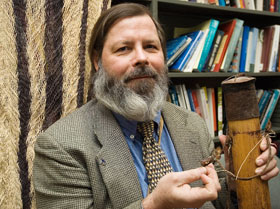  |
| HOME | THIS ISSUE | CALENDAR | GRANTS | BACK ISSUES | < BACK | NEXT > |
Anthropologist studies tribe noted for missionary killingsby Michael Kirk - January 30, 2006 |
||||
|
In the mid-1950s, five American Protestant missionaries went to South America to establish peaceful contact with an Ecuadorean tribe and convert them to Christianity. Fifty years ago this month, they were attacked with spears on a river’s edge by members of the tribe, the Waorani. All five missionaries were killed. A few years later, most of the tribe was converted by relatives of the slain missionaries. “In order to end the cycle of violence, one needs a means to convey a message contrary to the enraged emotional one,” says UConn anthropology professor James Boster, co-author of a 2003 article about the killings and subsequent conversion in Ethos, the journal of the Society for Psychological Anthropology, a section of the American Anthropology Association. “The pacification of the Waorani was incredibly rapid,” Boster says. “In a six-year period from 1967 to 1973, more than 500 Waorani came to escape the violence and to settle in the Wao community of converts.” For as long as any members of the tribe could remember, Waorani society had been torn by a cycle of revenge killings among warring factions. Although there were brief periods of relative peace, the violence brought the tribe to the point of extinction. According to Boster, the Waorani considered outsiders, including the missionaries, to be savages. In 1959, the widow of one of the missionaries and the sister of another entered Waorani territory to persuade the Waorani to give up warfare, convert to Christianity, and live peaceably. The fact that the relatives of the people they had slain came not in revenge but in an effort to help, made an impression on the tribe, Boster says. The Waorani reasoned that if Christianity was able to keep the outsiders peaceful, perhaps it would work for them as well. Conversion to Christianity became a way of signaling their commitment to give up revenge killing, allowing the tribe to live in peace. Marking the 50th anniversary of the murders, an independent film – End of the Spear – about the killings and the eventual conversion of the tribe, was released nationwide on Jan. 20. Boster worked on the article with anthropologist James Yost and linguist Catherine Peeke of the Summer Institute of Linguistics, who are both fluent speakers of Waorani and have spent many years living and working with the Waorani.
“In the case of the Waorani, peace came following the arrival of Protestant missionaries,” says Boster. The article notes that the pacification and concentration of 85 percent of the population on less than a hundredth of a percent of the original territory accomplished several things simultaneously: It ended the feuding by offering an area of refuge, it allowed kin to reunite with one another, it allowed many people to find spouses, and it gave the Waorani important access to trade goods. Thus, the authors write, many of the problems caused by the continual violence were solved by conversion to Christianity and mass resettlement in a newly created Christian community. One of the Waorani who joined in killing the missionaries in 1956 but was one of the earliest converts to Christianity is quoted in the paper. “Before the [missionaries] came and taught us about God,” he says, “we lived spearing. Back and forth, back and forth, we speared, they died. We tried to stop killing. We would say ‘that’s enough, leave off spearing.’ Then someone would kill and we would return to killing back and forth. After hearing and believing in God, [another tribesman] and I told them not to spear on our behalf, no matter how we died. And we ceased killing others back and forth. Just a few years ago, when some young Waorani men killed my sister, I refused to spear on her behalf. Had I not believed, they would all be dead now.” Boster says, “The Waorani need for a means to convey a message contrary to the enraged emotional one was met by the introduction of Christianity. Ironically, it may have been the fact that the first missionaries to be able to approach them were kin of those who had been slain by the Waorani that most clearly indicated to them that this religion was a reliable means to signal a commitment to peace. “In other words,” he adds, “the Waorani were converted not by Christianity, but by the good works and forgiving acts of Christians.” |
| ADVANCE HOME UCONN HOME |

